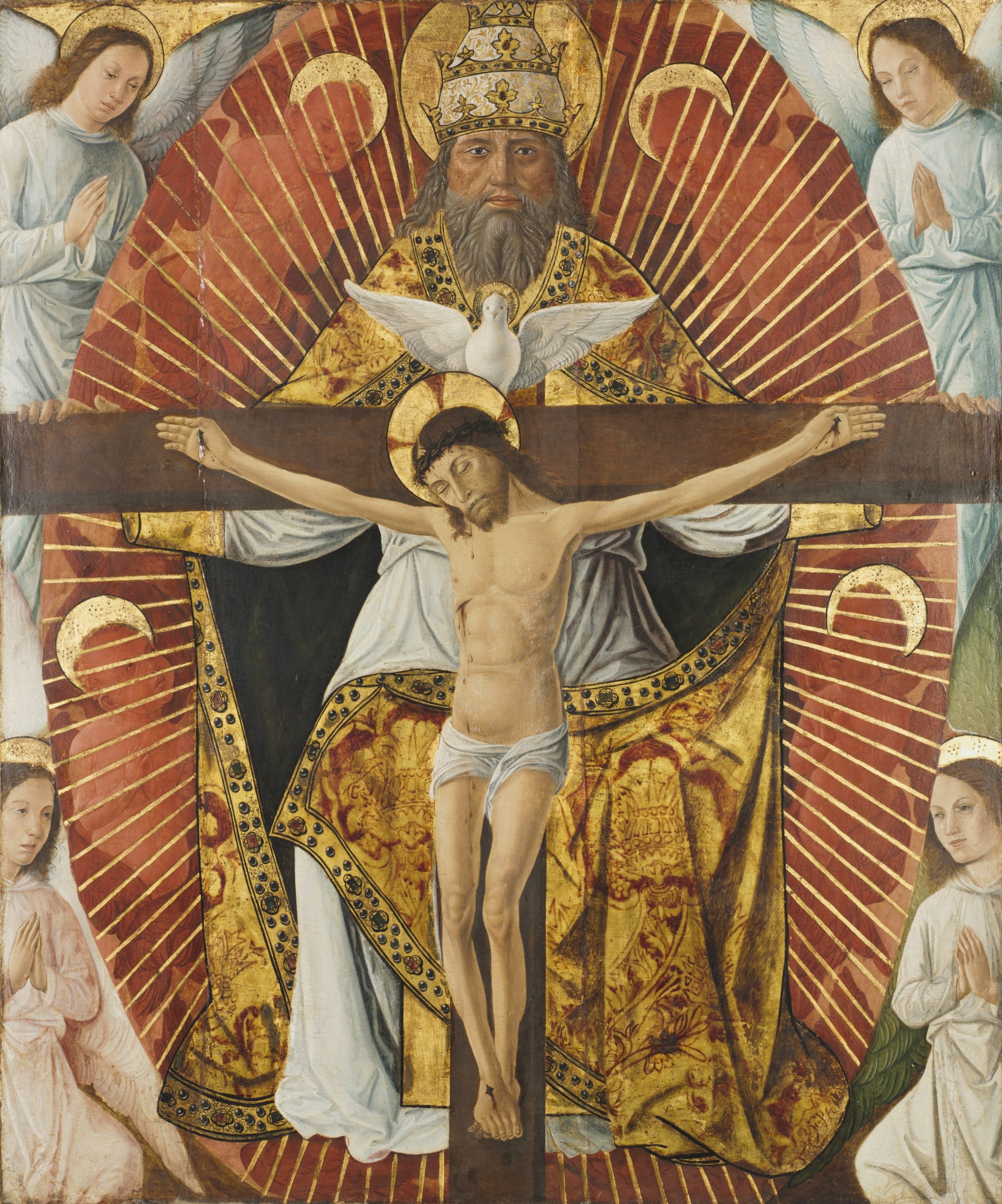
The Trinity by Laurent Girardin (c. 1478)
This year marks the 1700th anniversary of the Council of Nicaea, held in 325AD. Once Christianity was legalised by the Emperor Constantine’s Edict of Milan in 313AD, the bishops of the Church had the liberty to think more deeply about what we believe. Soon enough, confusion arose. One of the key points of confusion concerned the Trinity. On the one hand, Sacred Scripture describes God as One. On the other hand, Sacred Scripture reveals three distinct identities within the one God. How could God both be one and three? The Council of Nicaea was convened to resolve this question. Over 200 bishops attended, the largest gathering of bishops at the time.
The bishops struggled to find Greek or Latin words that could accurately define the identity and relationships of Father, Son and Holy Spirit. Indeed, in order to describe God accurately, the bishops invented new words. The new word the bishops invented to define the unity of God was homoousios. This Greek word is a combination of two words: homo meaning “the same” and ousios meaning “substance or essence”. In Latin, the word translated as consubstantialem. In English, the word is consubstantial. The substance or essence of God is divinity. To say that the Father, Son and Holy Spirit are homoousion or consubstantial is to say that they are one God, not three gods. After three months of deliberations, the Council of Nicaea published the Nicene Creed in Greek and Latin. This is the Creed we recite at Mass each Sunday.
In 2011, the Catholic Church released a revised English translation of the Mass. This new translation is vastly superior to the old translation because it is more accurate. One of the new words that appeared in the Nicene Creed was the word ‘consubstantial’. Whereas, in the old translation, we professed that Jesus was “one in being” with the Father, now, in the revised translation, we profess that Jesus is “consubstantial with the Father.” When we use that word, we are expressing the full and accurate belief of the Catholic Church as first articulated 1700 years ago at the Council of Nicaea.
Of course, all this begs the question: why does the doctrine of the Trinity matter? According to the Catechism of the Catholic Church (n. 234):
“The mystery of the Most Holy Trinity is the central mystery of Christian faith and life. It is the mystery of God in himself. It is therefore the source of all the other mysteries of faith, the light that enlightens them. It is the most fundamental and essential teaching in the hierarchy of the truths of faith.”
The Catechism says that the doctrine of the Most Holy Trinity is the light that illumines our darkness. In other words, the doctrine of the Trinity is the key to understanding all reality. Looking at the Trinity helps us understand everything, for everything originates in and reflects the Trinity.
Saint John tells us that “God is love”. Love is the gift of self to another. In other words, love is never an individual business: it always requires another. At the same time, love tends to unite. Those who give themselves in love are made one by their love. Thus, Saint Augustine defined the Trinity as Lover, Beloved and Love. The Father is the Lover, the Son is the Beloved, and the Holy Spirit is the Love reciprocated by Father and Son. Here’s the point: only a Trinitarian God can be a God of love. God is love precisely because God is a unity of three Persons.
God expresses His love by creating new life. The book of Genesis suggests that each Person of the Trinity was involved in bringing all life into being. God the Father creates by speaking His Word, who is the Son. God’s Word becomes creative through the presence and action of God’s Spirit, which hovers over the waters. Everything God creates is good. Humanity is very good. All that exists is the fruit of the overflowing love of the Triune God.
Only a God who is love can create goodness and life. The very fact there is something rather than nothing is because God is not an introspective narcissist: God is a loving communion of Persons who constantly seeks to give Himself as a gift.
The supreme desire of the Trinity is to expand. Saint Paul explained to the Romans that God makes a gift of Himself to us: “The love of God has been poured into our hearts by the Holy Spirit which has been given us.” Beginning at Baptism, God begins to dwell within us by grace. Saint Paul goes on to explain that because “we have entered this state of grace… we can boast about looking forward to God’s glory.” God comes to dwell in us now by grace precisely so that we can dwell in God’s glory in heaven. The Most Holy Trinity created humanity to share the Trinity’s inner life of love for all eternity.
This is what we profess with all those clunky words in the Creed.
